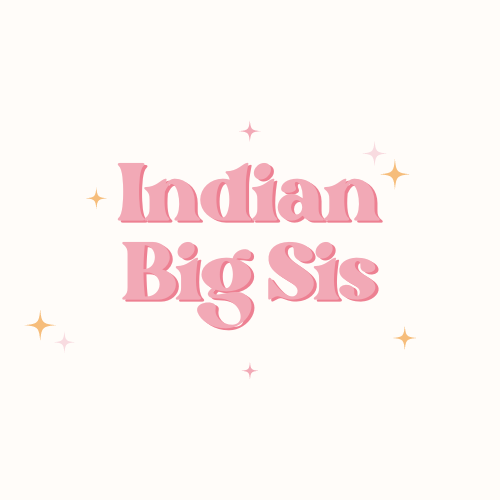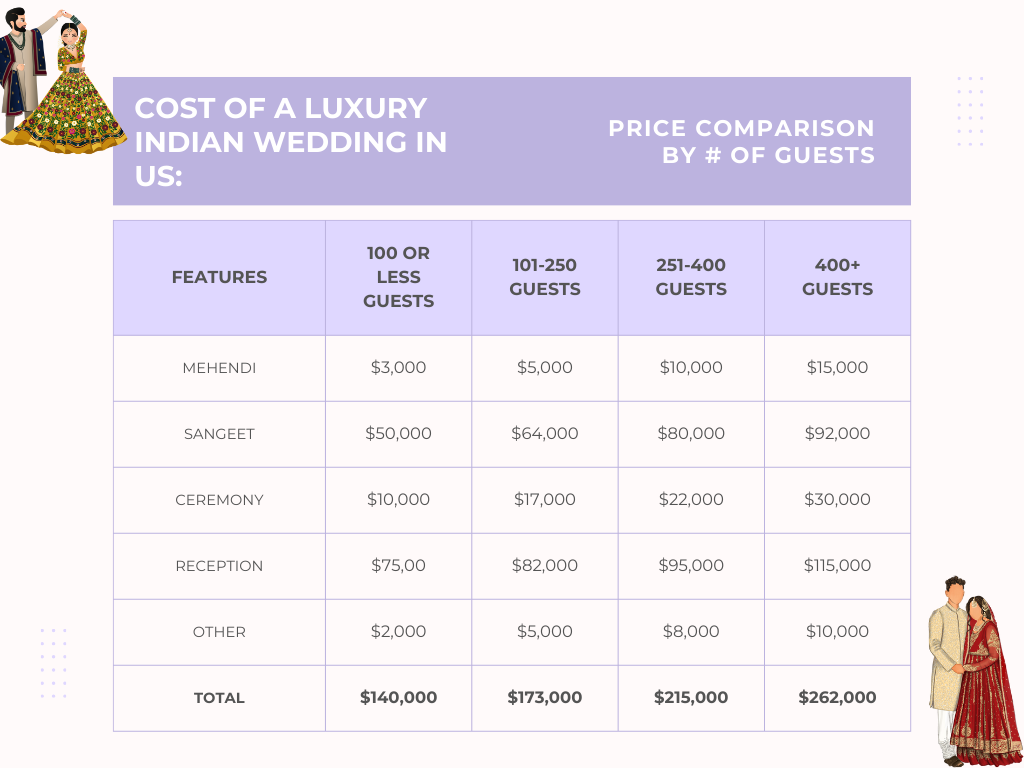
Indian weddings are known for their grandeur, rich traditions, and extravagant celebrations. However, it’s important to have a clear understanding of the financial implications associated with hosting such events in the American context. In this article, we will provide a comprehensive breakdown of the various expenses involved in planning and executing an Indian wedding, shedding light on the true cost and offering practical tips for a more efficient planning process.
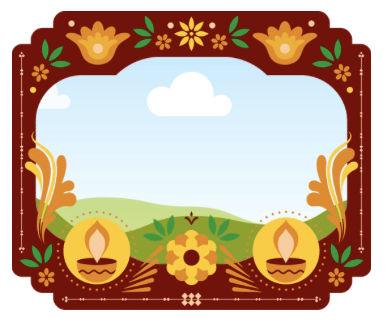
Venue Expenses: The venue is one of the major expenses in an Indian wedding. A luxurious banquet hall or hotel ballroom can cost anywhere between $8,000 to $30,000, depending on the location, size, and amenities. Outdoor venues, such as gardens or vineyards, may range from $10,000 to $50,000. Indian wedding venues often charge rental fees based on the event duration, guest count, and date of the event.Indian wedding venues may also charge for parking, valet services, security, and other miscellaneous expenses. These fees can vary based on the venue and services required, so be sure to clarify them in advance.
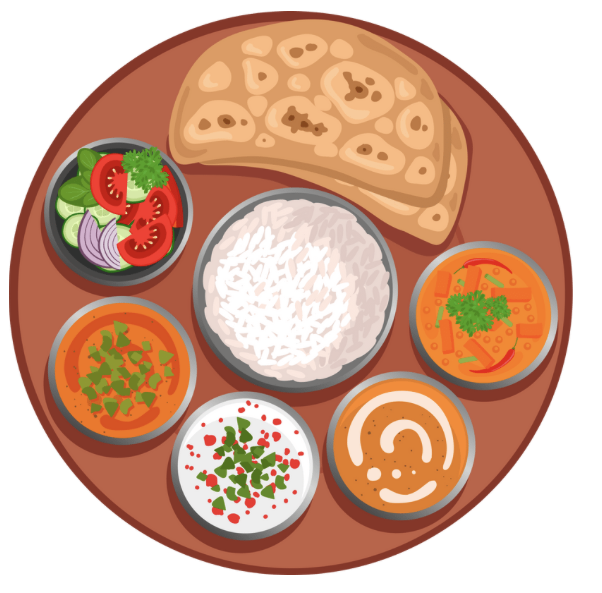
Catering and Food Costs: Indian wedding catering packages typically include a range of dishes, including appetizers, main courses, desserts, and beverages. These packages vary based on the menu selection, number of guests, and catering vendor. On average, wedding catering costs can range from $50 to $150 per person per meal, depending on the package chosen. Overall, food expenses for an Indian wedding can range from $10,000 to $50,000 or more, depending on the catering package, menu selection, and guest count. By carefully considering your options and working with reputable catering vendors.

Decorations and Floral Arrangements: Indian wedding decorations can include a variety of elements, such as fabric drapes, floral garlands, candle arrangements, traditional torans (decorative arches), and ornate centerpieces. These elements often incorporate traditional Indian handicrafts and fabrics, such as silk, brocade, and embroidery, to create a rich and opulent setting. Indian weddings are also known for their elaborate decorations and stunning floral arrangements. Decor expenses can range from $5,000 to $20,000 or more, depending on the intricacy and scale of the designs. This includes stage setup, mandap decorations, lighting, linens, and other decorative elements.
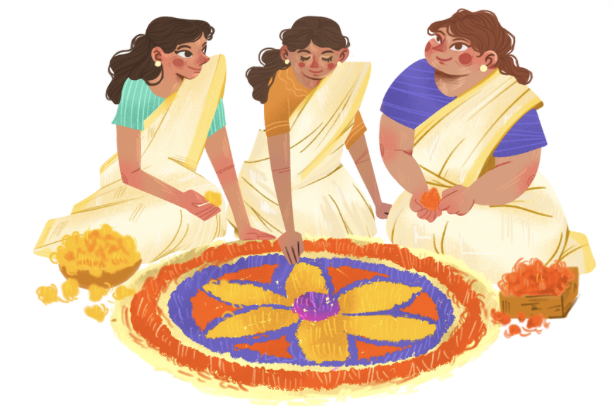
Attire and Jewelry: The bride’s attire and jewelry are significant investments in an Indian wedding. Attire and jewelry play a crucial role in Indian weddings, often symbolizing the couple’s heritage and status. The cost of attire and jewelry can vary widely depending on the quality, design, and materials used.
- Wedding Outfits: Traditional Indian wedding outfits for the bride and groom can range from a few thousand to tens of thousands of dollars, depending on the quality of materials, embroidery, and embellishments.
- Jewelry: Indian wedding jewelry can be as ornate and luxurious as the wedding outfits, with many pieces featuring real gold, diamonds, and precious stones. Brides typically wear a set of traditional bridal jewelry, including necklaces, earrings, bangles, anklets, and maang tikka.
- Bridesmaid attire: Indian bridesmaids typically wear colorful and ornate lehengas or sarees for the wedding ceremony, with prices ranging from as low as $100 to as high as $800. The price range for these outfits depends on factors like the fabric, embroidery, embellishments, and the designer.I n addition to the bridesmaids’ outfits, there are other costs associated with the bridal party, such as jewelry, hair and makeup services, shoes, and accessories. The total cost for all these items can range from a few hundred to several thousand dollars.
Photography and Videography: Capturing the precious moments of an Indian wedding is essential. Professional photography and videography services may range from $3,000 to $10,000 or more, depending on the package, duration, and additional services desired.
- Photography: The average cost of hiring a professional Indian wedding photographer can range from $3,000 to $20,000 or more, depending on the photographer’s experience, package inclusions, and the number of events they are covering (e.g., engagement, bridal shower, wedding ceremony, reception). Many Indian wedding photographers offer full-day packages, which typically include one or two photographers, an assistant, digital copies of the photos, and an album or online gallery.
- Videography: Similarly, the cost of hiring a professional videographer for an Indian wedding can range from $2,000 to $10,000 or more. The videographer’s package may include full-day coverage, multiple cameras, editing, and a cinematic highlight reel. Some videographers may also offer packages that include drone footage, aerial shots, and slow-motion footage for a more immersive experience.
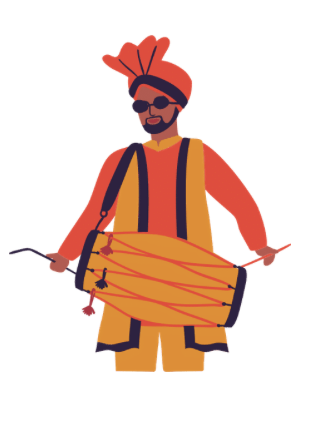
Entertainment and Music: Entertainment and music are integral parts of an Indian wedding, providing a lively and festive atmosphere for guests. The cost of entertainment and music for an Indian wedding can vary widely depending on factors such as the type of entertainment, the number of performers, and the location of the wedding.
- Entertainment: Some popular entertainment options for Indian weddings include live bands, DJs, classical Indian dancers, henna artists, and fire dancers. The cost of these services can range from $500 to $10,000 or more, depending on the number of performers and the length of their performances. For example, a 5-piece live band may charge around $2,500 for a 2-hour performance, while a professional DJ can charge from $1,000 to $3,000 for a full evening of music.
- Music: The cost of music for an Indian wedding can also vary widely, depending on the type of music, the number of musicians, and their level of expertise. Classical Indian music, such as a band of sarod, sitar, and tabla players, can range from $500 to $5,000 or more for a performance.
Miscellaneous Expenses: Indian weddings often involve a variety of miscellaneous expenses beyond the major categories like venue, food, and entertainment. Here are some common miscellaneous expenses to consider:
- Gifts: It is customary for the bride and groom to exchange gifts during the wedding, and these gifts can range from simple tokens of appreciation to lavish presents. The cost of gifts can vary widely, but budget anywhere from $100 to $1,000 or more for gifts to exchange with your partner, family members, and friends.
- Transportation: Arranging transportation for guests and family members is an important aspect of Indian weddings, especially if the events are held at multiple locations. The cost of transportation can range from a few hundred dollars for simple car rentals to thousands of dollars for luxury vehicles like limousines or party buses.
- Accommodation: If you are hosting out-of-town guests, you may need to budget for their accommodation costs, especially if they are staying at the same hotel as the wedding events. This can range from $100 to $300 or more per night, depending on the hotel’s location and quality.
Tips for Effective Planning:
- Set a realistic budget: Allocate funds to different categories and prioritize expenses accordingly.
- Research and negotiate: Compare prices, seek recommendations, and negotiate with vendors to get the best deals.
- Guest list management: Carefully manage the guest list to control costs associated with catering and venue expenses.
- Consider DIY options: Explore do-it-yourself options for decorations, favors, and stationery to save costs.
- Seek professional advice: Consult with wedding planners who specialize in Indian weddings to maximize efficiency and minimize expenses.
Hosting an Indian wedding in America is a dream come true for many couples and families. However, it’s crucial to have a realistic understanding of the financial investments required. By considering the actual dollar values associated with different aspects of the wedding and following practical tips, couples can plan more effectively and create a memorable celebration within their budget. Remember, the true essence of an Indian wedding lies in the love, happiness, and meaningful connections shared, rather than the extravagance of the event.
